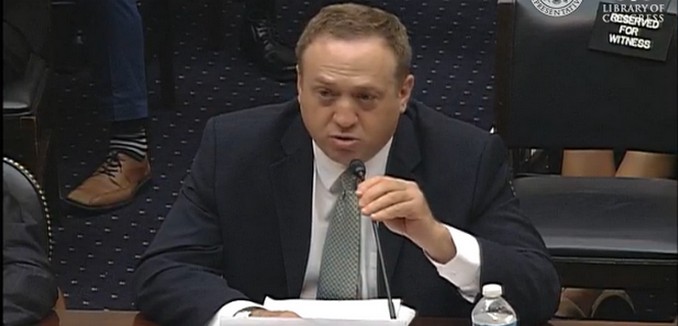Michael Makovsky, the CEO of the Jewish Institute for National Security Affairs, testified that the emerging nuclear deal with Iran will hurt American interests and credibility in the Middle East at a hearing of the House Foreign Affairs Committee yesterday.
In the beginning of his testimony (.pdf), Makovsky highlighted five significant shortcomings of the deal currently being negotiated.
First, rather than forcing Iran’s leaders to choose between guns and butter, it gives them much more of both. Sanctions relief will give Iran tens of billions of dollars from released funds and increased oil exports over the next year, which will strengthen this radical and repressive regime and supercharge its support for Hamas, Hezbollah and other terrorism, regional mischief-making, as well as its spending on its own military buildup.
Second, in 10-15 years Iran will be permitted to expand its already robust nuclear program as it wishes. It will legally be treated like Japan.
Third, the deal might provide for greater inspections, but these will not be robust enough to detect or deter Iranian cheating. The deal apparently would at most require Iran to adhere to the “Additional Protocol,” but no Additional Protocol contains the required “anytime, anywhere” inspections, including access to military sites, which is most likely where Iran would construct a nuclear weapon. Complicating proper and full inspections, Iran hasn’t yet come clean on the possible military dimensions (PMD) of its nuclear program.
Fourth, even if inspections did detect Iranian violations, there’s serious reason to doubt that the Obama Administration would challenge Tehran over them. The Administration claims Iran has adhered to the Joint Plan of Action (JPA) interim deal of November 2013, yet Iran has violated it on several occasions. Most recently, Iran has been caught not converting enough enriched fuel to a form that would make it harder to be processed into nuclear weapon. Instead of challenging Iran, the Administration has acted as its defense attorney and attacked the independent American organization that made the finding. A Washington Post editorial this week referred to the White House’s “warped” “proclivity to respond to questions about Iran’s performance by attacking those who raise them.”
Fifth, and perhaps most puzzling, this deal would not require Iran to comply with legally binding U.N. Security Council resolutions against its ballistic missile programs
Makovsky further emphasized the shortcomings of the “sunset clause,” which would ensure that in ten to fifteen years “Iran will have a breakout time that is, in the president’s words, ‘almost down to zero’ … and Iran will become, with international blessing, a nuclear power.”
Makovsly argues that allowing Iran to achieve this status will have severe repercussions for American regional interests. He observed that the United States has “aligned itself with Iran’s interests in Syria, Iraq, Lebanon and Yemen,” and that after two decades of insisting that Iran give up its nuclear aspirations, the United States “is advancing a deal to legitimize their arch-rival’s nuclear program.” These shifts in policy will lead to a loss of credibility among America’s traditional Middle East allies.
The price to pay for this erosion of credibility and departure from established U.S. policy and interests will be grave. If this deal is completed, it will: guarantee the emergence of Iran as a nuclear power; place Israel in existential danger from Iran and the aggression of its terrorist proxies; set off a proliferation cascade that will raise the potential for conflict in the Persian Gulf, which incidentally act as bullish factor for oil prices; and empower and inspire radical Islamists across the region. With its credibility severely eroded, the United States – even if led by a new, determined president – will have significant difficulty restoring order to the region.
This loss of credibility will lead to “a realignment of interests in the region,” with traditional allies strengthening relationships with Russia and China at the expense of ties with the United States. America’s Arab allies would also likely pursue their own nuclear weapons programs in order to counter the threat from Iran.
The consequent proliferation threat, Makovsky argued, would then undermine the administration’s chosen path for dealing with Iran’s nuclear program: containment.
In reality, the challenges would be manifold and intractable, and the costs and risks prohibitive. First, successful containment is premised on deterrence, which in turn demands credibility. The United States by definition would have minimal credibility after having spent years declaring a nuclear Iran was unacceptable. Second, containment is innately reactive – it draws a line in the sand and waits for the adversary to try crossing it. This would allow Iran to try to challenge the United States and its allies over time, by engaging in slightly and steadily more provocative behavior piecemeal. Third, even when successful, containment is an indefinite, long-term obligation, based on a willingness to prevail in a contest of wills over some indeterminate period, and there is little indication so far that we wish to prepared to endure this contest and pay the price in blood and treasure. A final concern is whether the nature of the regime in Tehran – and other regimes or entities that might acquire nuclear weapons – would even render it containable with nuclear capability.
Makovsky, in his conclusion, summed up the risks inherent in the emerging deal by saying, “the consequence to this deal, however well-intentioned, would be much greater and longstanding Middle Eastern and global tension and higher risk of conventional war and even nuclear conflict that could draw in the United States.”
[Photo: House Foreign Affairs Committee ]




